(转发) Fix the upstream dependency conflict installing NPM packages
原文:Fix the upstream dependency conflict installing NPM packages | bobbyhadz
Fix the upstream dependency conflict installing NPM packages #
Use the --legacy-peer-deps flag to solve the npm error "Fix the upstream dependency conflict, or retry this command with --force or --legacy-peer-deps", e.g. npm install --legacy-peer-deps.
The flag causes NPM to ignore peer dependencies and proceed with the installation anyway.
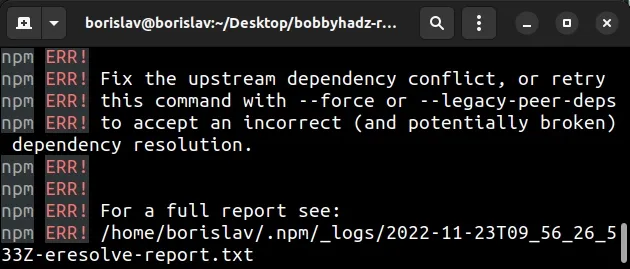
npm ERR! Fix the upstream dependency conflict, or retry
npm ERR! this command with --force or --legacy-peer-deps
npm ERR! to accept an incorrect (and potentially broken) dependency resolution.
npm ERR! For a full report see:
npm ERR! /home/borislav/.npm/_logs/2022-11-23T09_56_26_533Z-eresolve-report.txt
npm ERR! A complete log of this run can be found in:
npm ERR! /home/borislav/.npm/_logs/2022-11-23T09_56_26_533Z-debug-0.log
Try to run the npm install command with the --legacy-peer-deps flag.
npm install --legacy-peer-deps
# 👇️ or use the --force flag
npm install --force
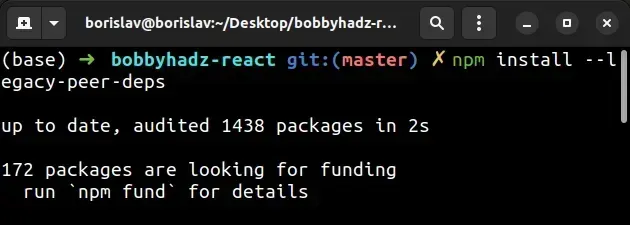
If you got the error when installing a specific module, add the --legacy-peer-deps flag at the end of the command.
npm install react --legacy-peer-deps
# 👇️ or use the --force flag
npm install react --force
react with the name of the module you're trying to install.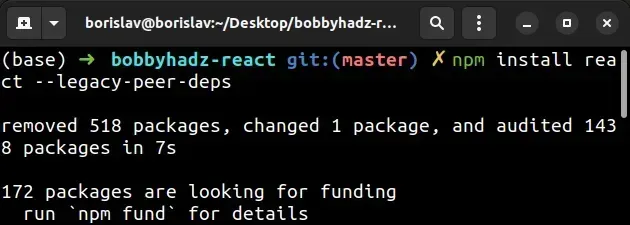
An alternative to setting the legacy-peer-deps flag for every command, is to set the behavior globally with the npm config set command.
npm config set legacy-peer-deps true

Starting with NPM v7, NPM installs peerDependencies by default. If you already have a peer dependency of the module installed, but not one of the specified by the module versions, NPM throws an error.
--legacy-peer-deps flag tells NPM to ignore peer dependencies and to proceed with the installation anyway.This was the default behavior in NPM versions 4 through 6.
In other words, NPM modules name specific versions of their peerDependencies.
If you have a different version of a peer dependency package installed, an error is raised unless you set the --legacy-peer-deps flag.
If the error persists, try to delete your node_modules and package-lock.json (not package.json) files, re-run npm install.
# 👇️ delete node_modules and package-lock.json (macOS/Linux)
rm -rf node_modules
rm -f package-lock.json
# 👇️ delete node_modules and package-lock.json (Windows)
rd /s /q "node_modules"
del package-lock.json
# 👇️ clean npm cache
npm cache clean --force
# 👇️ install packages
npm install
# 👇️ if you get an error, try with --legacy-peer-deps
npm install --legacy-peer-deps
Your error message should contain information about which dependency could not be resolved.
npm ERR! Could not resolve dependency:
# 👇️
npm ERR! peer react@">=17.0.1" from react-native-web@0.17.1
npm ERR! node_modules/react-native-web
npm ERR! react-native-web@"^0.17.1" from the root project
react version 17.0.1 or greater.You can use the following command to install a specific version of a package.
npm install react@17.0.1
And then, you can try to rerun your original npm install command.
Try to upgrade your version of NPM #
Another thing you can try is to upgrade your version of NPM.
npm install -g npm@latest
# 👇️ if you get permissions error on macOS / Linux
sudo npm install -g npm@latest
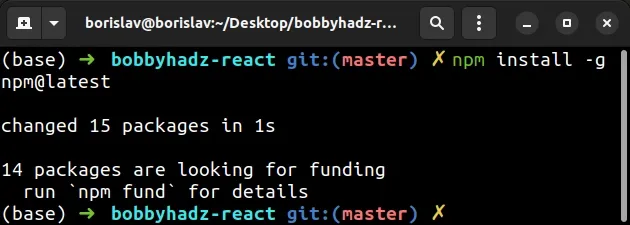
If you get a permissions error on Windows, open CMD as an administrator and rerun the command.
To open CMD as an administrator:
-
Click on the Search bar and type CMD.
-
Right-click on the Command Prompt application and click "Run as administrator".

- Rerun the command.
npm install -g npm@latest
npm install -g npm@latest --force
Try updating your NPM packages #
The npm audit fix command scans your project for vulnerabilities and automatically installs compatible updates to vulnerable dependencies.
The npm audit fix --force command installs major updates to top-level dependencies, which might introduce breaking changes to your project if you rely on older package versions.
npm install --legacy-peer-deps
npm audit fix --force
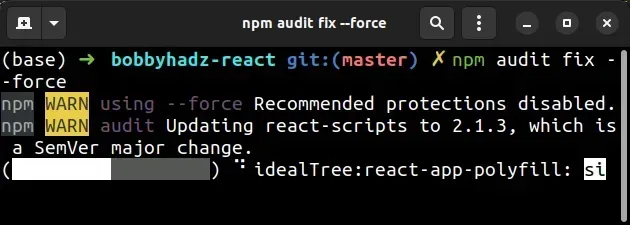
Try to restart your terminal and development server after running the commands.
If the error persists, try running the npm update command.
npm update
If the error persists, try to use the --force flag.
# 👇️ install all using --force
npm install --force
# 👇️ install specific package using --force
npm install react --force

The --legacy-peer-deps flag ignores all peer dependencies when installing (in the style on npm version 4 through 6).
Whereas, the --force flag forces NPM to fetch remote resources even if a local copy exists on disk.
Conclusion #
Use the --legacy-peer-deps flag to solve the npm error "Fix the upstream dependency conflict, or retry this command with --force or --legacy-peer-deps", e.g. npm install --legacy-peer-deps. The flag causes NPM to ignore peer dependencies and proceed with the installation anyway.



 浙公网安备 33010602011771号
浙公网安备 33010602011771号